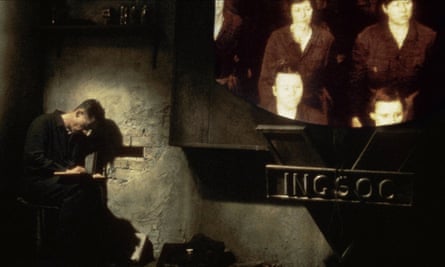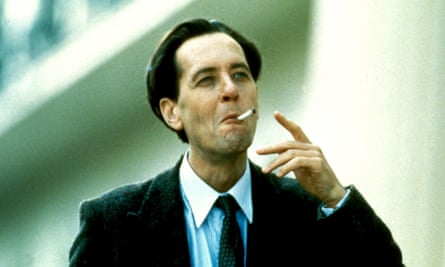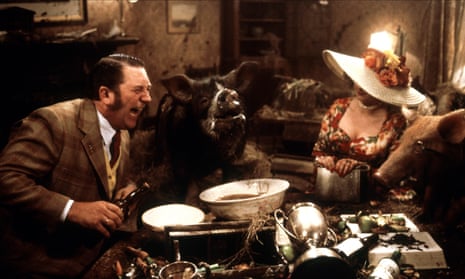Three years ago, in high hay fever season, I lost my sense of smell. It has never returned and I’m told it never will. Of all the five senses one can expect to part with en route to sans everything, smell is the most dispensable. And if the Freudians (and Jonathan Swift) are right that civilisation is the distance Homo sapiens (“Yahoos”) puts between his nose and his excrement, I am a more civilised person for living in my neutralised world. At about the same time that my nasal membranes wilted I embarked on a reread of Orwell, in the spirit of Janeites who revisit Austen’s novels every year, just to relax. The writings I had known for half a century were, I found, interestingly different. Not quite as comforting. Imagine, for example, a person born with no sense of smell. Would Animal Farm “read” the same way as for someone with functioning nostrils and long familiarity with the richly mixed but detectably different aromas of a farmyard? And then, at the end, Napoleon walking past on two legs with an aromatic cigar.
According to Norman Mailer, a fellow connoisseur, with Orwell, of life’s olfactions, there “ain’t but three smells” in the whole Hemingway oeuvre. Compare the first three richly scene-setting aromas in Nineteen Eighty-Four. The story opens with Winston Smith escaping the April cold through the glass doors of Victory Mansions. Instant nasal attack: “The hallway smelt of boiled cabbage and old rag mats.” Having slogged up to his flat on the seventh floor (the lift, of course, is broken), Winston pours himself a reviving swig of Victory gin. “It gave off a sickly, oily smell, as of Chinese rice-spirit.” He smokes a Victory cigarette (no need to describe that acrid smell).

There are many threads in Orwell’s fiction, but it is interesting to compile what I think of as their smell narratives. For some authors these would be as terse as a 140-character tweet. I asked Deirdre Le Faye, the doyenne of Jane Austen studies and editor of her surviving letters, what smells there were in the six novels. She said: “Smell, I think, is only specifically mentioned in Mansfield Park, with the bad air and bad smells of the Portsmouth house. This does strike me as slightly odd, because by our standards at least, the past must have been a fairly smelly place.” The “lady” who wrote Sense and Sensibility was, apparently, short of one sense.
Orwell, who claimed he would have preferred to have lived 200 years ago, with his fellow “Tory-anarchist” Swift, might have found that equine excremental world more bearable, attractive even, than the world he was born in. He loathed 20th-century mechanical smells – although paraffin (his most common source of heating and lighting, when in the country) he found oddly “sweet” to his nostrils, probably because of its association with warmth and light. More than most 20th-century authors, he did a lot of reading and writing by Tilley lamp, the odoriferous heater throwing its mottled pattern on to the ceiling.
One of Orwell’s perceptive observations in his 1946 essay “Politics vs Literature”, on his most admired author, Swift, is that in Gulliver’s Travels the morbidly naso-sensitive hero finally accepts as his ideal the horse, “an animal whose excrement is not offensive”. It is a “diseased” choice on Swift’s part, Orwell grants. But Gulliver’s first experience when he arrives in Houyhnhnms Land is to be spattered with human shit. Of the two varieties, which would one prefer? Orwell was, whenever the opportunity came up, a smallholding farmer: horse manure he valued as fertiliser (there are diary entries recording him examining minutely the quality of recent droppings). Pigs (he hated the omnivorous pig) were useless for that purpose. Human excrement, like that of other carnivores, is offensive. Graminivores and herbivores, such as the horse and goose (an animal Orwell loved and kept, whenever he could), have inoffensive excrement.
I’ve often wondered where vegan droppings would stand on the Orwellian offensiveness scale. But Orwell despised “sandal-wearers” and “fruit-juice drinkers” as cranks, and they would not have attracted his nasal interest. He despised, as he told his working-class friend Jack Common, “eunuch types with a vegetarian smell”. The reasons Orwell, ruinously for his health, spent the best years of his adult life in Burma are hard to disentangle. But one was surely the call of the nostalgic curries, and the fading but still pungently mingled scents of sandalwood, rattan and teak in the Anglo-Indian house in which he was brought up. He could not, joked Cyril Connolly, “blow his nose without moralising on conditions in the handkerchief industry”. Or sniff, one suspects, his mother’s vindaloos and chutneys, without wondering about the subcontinent and the ethics of colonialism.
Orwell’s socialism is a battleground. One thing one can safely say is that his political thought is commonsensical and that the Orwellian “smell test” is central to it. Who but Orwell would diagnose the malaise of socialism in 1936 nose-first, as a malodor? “Socialism, at least in this island, does not smell any longer of revolution and the overthrow of tyrants; it smells of crankishness, machine-worship, and the stupid cult of Russia. Unless you can remove that smell, and very rapidly, Fascism may win.” It is hard to think of it inspiring a rousing call (“We must reform our smell, comrades!”) at the annual Labour party conference. But it is echt Orwellism.
Orwell trusted the smell test, and made crucial changes in his life on the strength of it. When he came back for good, after five years in Burma, “one sniff of English air” confirmed that he had done the right thing. The nose knows. One inhalation, and he decided he was never going back. Orwell was, elsewhere, raised to heights of mirthful satire by the odour of leftwing “crankishness”: “It would help enormously, for instance, if the smell of crankishness which still clings to the Socialist movement could be dispelled. If only the sandals and the pistachio-coloured shirts could be put in a pile and burnt, and every vegetarian, teetotaller, and creeping Jesus sent home to Welwyn Garden City to do his yoga exercises quietly!”
Another kind of socialism – which Orwell repudiated more angrily – was the hypocritical, silk sheets, variety. There is a telling episode in Keep the Aspidistra Flying. Gordon Comstock (a “moth-eaten”, prematurely burnt out, talentless, self-punitive caricature of Orwell himself) bullies his rich magazine-proprietor friend and patron, Philip Ravelston, into accompanying him into a working-class pub. Ravelston is an ungrateful caricature of Richard Rees, the “socialist baronet” and proprietor of the Adelphi magazine. It was “Dickie” who assisted Orwell into authorship, publishing the nucleus of articles that became his first book, Down and Out in Paris and London. Comstock drags his rich best friend into the awful-smelling spit-and-sawdust boozer: “A sour cloud of beer seemed to hang about [the place]. The smell revolted Ravelston.” They are served two pints of “dark common ale” (“mild”, for those who can remember the sickly sweet-smelling swill). The air is “thick with gunpowdery tobacco smoke”. Ravelston catches sight of a well-filled spittoon near the bar, averts his eyes and thinks, wistfully, of the wines of Burgundy. The two friends have their usual argy-bargy about socialism. Ravelston tries, vainly, to explain Marx. What does Marx mean, Comstock snorts, in the stinking “spiritual sewer” to which £2 a week has consigned him? “He began to talk in obscene detail of his life in Willowbed Road [his fifteen-bob-a-week lodgings]. He dilated on the smell of slops and cabbage, the clotted sauce-bottles in the dining-room, the vile food.” ‘It’s bloody,’ murmurs Ravelston several times, in feeble sympathy.
Bad-tempered, and with a belly full of bad beer, the two men go out into the now night-time street. The discussion drags on. If you’re poor, says Comstock, those who are not poor hate you – because you have a bad smell: “It’s like those ads for Listerine. ‘Why is he always alone? Halitosis is ruining his career.’ Poverty is spiritual halitosis.” Perverse, thinks Ravelston, with an automatic sniff. Desirable women won’t look at you, complains Comstock, now in full cry. You have to buy sex from women who smell as bad as you (there’s a later scene when, very drunk, he does just that). Ravelston thinks, inwardly, of his fragrant mistress, Hermione, as wholesome to her lover’s nostrils as a “wheatfield in the sun”. “Don’t talk to me about the lower classes,” she always says whenever he brings up his damned socialism. “I hate them. They smell.” She must not call them the “lower classes”, he objects mildly (tacitly agreeing with the smell point). They are the “working class”. Very well, she says, “But they smell just the same.”
The two men go their separate ways: Comstock to his slops and cabbage in Willowbed Road; Ravelston by taxi to his flat, where a sleepy Hermione is waiting for him, curled voluptuously, half-dressed, in an armchair. “We’ll go out and have supper at Modigliani’s,” she commands (in other words, Quaglino’s in Piccadilly, London’s best restaurant). In the taxi she lies against him, still half asleep, her head pillowed on his breast. The “woman-scent” breathes out of her. Philip inhales it, sensually, thinking of his favourite corner table at Modigliani’s and of sex, trying not to think of that vile pub with its hard benches, stale beer-stink and brass spittoons. Outside Modigliani’s a beggar importunes them for money: “A cup of tea, guv’nor!” The request is half-coughed through “carious teeth”. Halitosis. Spittle. Phlegm. Smell. Hermione forbids Ravelston to give him a single penny. Ravelston obeys. His socialism is a paper and print thing. He loves the people – but not their smell. He and Hermione dine, expensively, on rump steak and half a bottle of Beaujolais. A feast to the nose and the palate.

Orwell’s feelings towards Rees and his kind were deeply confused. He was grateful enough for favours given to name his son (Richard Blair) after the baronet who so helped his early career and whom he made his literary executor. He liked the man. Who could not? Everyone who knew him liked him. Yet Orwell hated Rees “for what he was”. Rees/Ravelston’s kind of socialism, well meant as it might be, smelled wrong to Orwell because it had the aroma of expensively scented sex, French cuisine and newly washed underwear. Where, then, was the healthy smell of socialism to be found? Not in that hotbed of theory, the LSE, dominated by the Laski faction – those incorrigible abusers of plain English (half-gramophone, half-megaphone, all phoney) and sympathisers with Moscow. Not in the brimming chamber pot under the working-class Wigan breakfast table. Not in what is called, in Aspidistra, the “money stink” that leaks, like furtively broken wind, from the well-meaning, well-bred rich, such as Ravelston.
It is found in two places, one deduces from Orwell’s writing. One is the naked coal miner, hundreds of feet underground, his muscled body exposed in the murky light: “Nearly all of them have the most noble bodies; wide shoulders tapering to slender supple waists, and small pronounced buttocks and sinewy thighs, with not an ounce of waste flesh anywhere.” Around them the “fiery dusty smell” of their workplace. It is a real smell. The stench of honest labour and erect manhood. The other location where socialism smells “right” is the trenches of wartime Spain.
“I suppose I have failed to convey more than a little of what those months in Spain meant to me,” says Orwell in the epilogue to Homage to Catalonia: “I have recorded some of the outward events, but I cannot record the feeling they have left me with. It is all mixed up with sights, smells, and sounds that cannot be conveyed in writing.”
Orwell’s nose can do more than most, but it cannot put into words what it knows is right, and what is wrong. And what, one wonders, would socialism smell of now, in the second decade of the 21st century, were Orwell and his diagnostic nose here to sniff it for us?

Comments (…)
Sign in or create your Guardian account to join the discussion